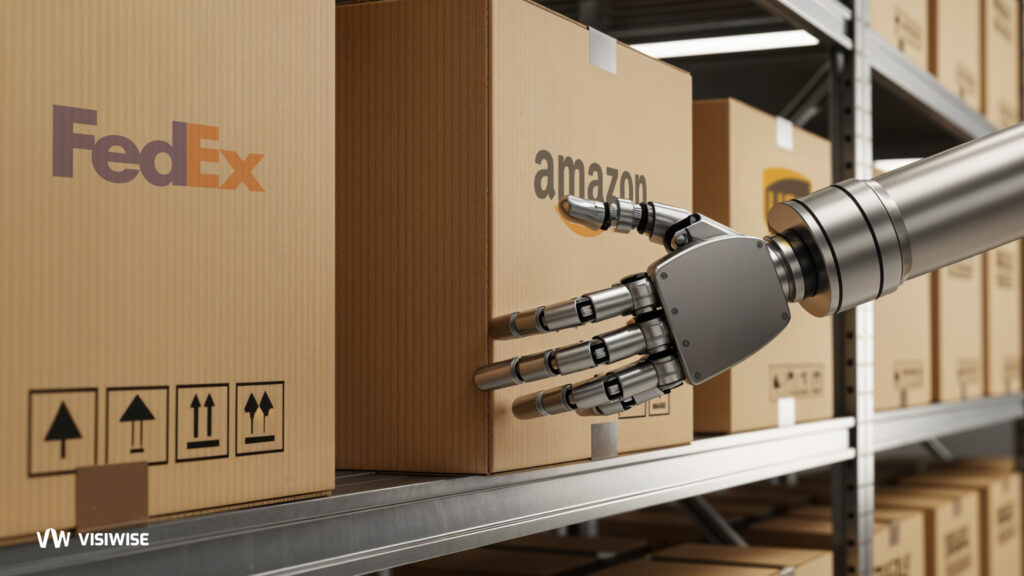Shipping goods—whether for personal moves, business exports, or online sales—can feel overwhelming. Between pickup, customs, and final delivery, the logistics puzzle is enough to make anyone’s head spin. That’s where door-to-door shipping comes in. It’s the "white-glove" service of freight, handling everything so you don’t have to
But how does it really work? Is it worth the cost? And how do you pick the right provider without getting burned?
In this guide, we’ll break down everything you need to know on how to get your stuff where it needs to go, stress-free.
What Exactly Is Door-to-Door Shipping? (And Why It’s a Game-Changer)
Door-to-door shipping means exactly what it sounds like: a carrier picks up your goods from your location (whether that’s your home, warehouse, or store) and delivers them directly to your recipient’s door. No middle steps, no extra hassle—just one company handling the entire journey.
How It Differs from Other Shipping Methods
- Port-to-Port: You (or your agent) handle pickup and final delivery. The carrier only moves goods between ports.
- Door-to-Port: The carrier picks up from you but only delivers to a destination port. You arrange the last-mile delivery.
- Port-to-Door: The opposite—goods are collected from a port and delivered to the recipient’s address.
Door-to-door is the most hands-off option, ideal if you:
✔ Don’t have a logistics team
✔ Are shipping internationally (customs is a nightmare if you DIY)
✔ Want real-time tracking without juggling multiple providers
Who Uses It?
- E-commerce sellers shipping bulk orders overseas
- Expats moving household goods
- Businesses importing/exporting inventory
- Anyone who values time over penny-pinching
The Step-by-Step Door-to-Door Shipping Process (With Real-World Timelines)
Ever wondered what actually happens after you book a door-to-door shipment? Here’s the behind-the-scenes breakdown:
Step 1: Pickup & Packaging
- A driver collects your goods (pallets, boxes, even vehicles).
- Pro Tip: Some providers (like DHL Express) offer packing services—worth it for fragile items.
Step 2: Transport to Origin Hub
- Your shipment moves to a port, airport, or cross-border trucking terminal.
- Timing: 1–3 days domestically, longer for rural areas.
Step 3: International Transit
- Air Freight: Fast (3–7 days) but expensive. Best for urgent, high-value items.
- Ocean Freight: Slow (20–45 days) but cheap. Ideal for large, non-perishable cargo.
- Watch Out: Holidays (like Chinese New Year) cause delays. Plan ahead.
Step 4: Customs Clearance (The Make-or-Break Step)
- The carrier submits paperwork (commercial invoice, packing list, etc.).
- Customs may inspect goods (random checks add 1–5 days).
- Nightmare Scenario: Incorrect HS codes = held shipments + fines. A good provider prevents this.
Step 5: Final Delivery
- Last-mile transport (often by local trucking partners).
- Pro Move: Confirm if “door-to-door” includes unloading (some don’t!).
Real-World Example:
A client shipped furniture from Texas to Germany via Loup Logistics:
- Pickup: June 1
- Ocean transit: June 3–July 10
- Customs clearance: July 12 (2-day delay for inspection)
- Delivery: July 15
Total: 45 days (standard for ocean freight).
The Biggest Advantages of Door-to-Door Shipping (Beyond Convenience)
Sure, not dealing with logistics is nice—but here’s why businesses and individuals swear by door-to-door:
1. No Surprise Fees (If You Pick the Right Provider)
Ever gotten a "port storage fee" bill because your cargo sat too long? With door-to-door, the provider eats those costs if delays are their fault.
2. One Point of Contact = Fewer Mistakes
Juggling multiple vendors (trucking, customs brokers, etc.) increases errors. One provider = one throat to choke if things go wrong.
3. Built-In Cargo Insurance
Many carriers (like DFH Freight) include basic insurance. For high-value items, upgrade to full coverage.
4. Transparency with Tracking
Providers like Freightos and DHL offer real-time GPS tracking—no more "Where’s my container?" panic calls.
When It’s Worth the Cost:
- Shipping high-value goods (avoiding theft/loss)
- Time-sensitive deliveries (air freight door-to-door beats DIY port chaos)
- First-time shippers (prevents customs disasters)
The Hidden Challenges (And How to Avoid Them)
Door-to-door isn’t perfect. Here’s what can go wrong—and how to dodge it:
Challenge 1: "Door-to-Door" Doesn’t Always Mean "Door-to-Door"
- Some providers drop shipments curbside (no unloading).
- Fix: Confirm “liftgate service” for heavy items.
Challenge 2: Customs Delays
- Missing paperwork? Your shipment gathers dust.
- Fix: Use providers with in-house brokers
Challenge 3: Rural Area Surcharges
- Remote destinations = extra fees.
- Fix: Get a quote upfront (sites like SeaRates compare costs).
Red Flags in a Provider:
- Vague contracts (“additional fees may apply”)
- No tracking portal
- Bad reviews about lost shipments
Door-to-Door vs. Port-to-Port: Which Saves More Money?
| Scenario | Door-to-Door | Port-to-Port |
| Cost | Higher (all-inclusive) | Cheaper (but you pay for trucking, customs, etc.) |
| Time | Faster (provider optimizes transit) | Slower (you coordinate each step) |
| Stress Level | Low | High (unless you have a logistics team) |
When Port-to-Port Might Work:
- You’re shipping bulk non-urgent goods (e.g., 20 containers yearly)
- You have a freight forwarder on retainer
For everyone else? Door-to-door’s predictability wins.
How to Choose a Door-to-Door Provider (Without Regrets)
1. Check Their Specialty
- DHL Express: Best for urgent air shipments
- Loup Logistics: Heavy equipment experts
- DoorToDoorCo: Consumer-friendly (small moves)
2. Verify Customs Expertise
Ask: "Do you handle paperwork in-house?" If not, steer clear.
3. Compare Hidden Fees
- Demurrage charges
- Remote area fees
- Weekend pickup/delivery surcharges
Pro Tip: Lone Star Logistics has a free checklist for vetting providers.
Final Thoughts
Sure, door-to-door shipping costs more – but you’re not just paying to move boxes. You’re paying for the luxury of not having to think about it. These are the pros who navigate customs paperwork before breakfast, who know exactly which ports are backed up this week, and who’ve built relationships with every trucking company between here and your destination. For businesses where late shipments mean lost sales, or for anyone shipping irreplaceable items, that expertise is worth every penny. At the end of the day, you’re not just buying a delivery – you’re buying back your peace of mind.
FAQ
What’s the actual difference between door-to-door and door-to-port shipping?
Door-to-door: The shipping company handles everything from pickup to final delivery at your doorstep. You just wait for your goods to arrive.
Door-to-port: The carrier only delivers to the destination port/airport. You (or a local agent) must arrange the final transport.
Which one’s better?
- Door-to-Door → Less stress, more $
- Door-to-Port → More work, less cost
How do I choose a good door-to-door provider?
Look for:
- Direct partnerships with airlines, shipping lines, and trucking companies
- In-house customs expertise to avoid delays
- Clear pricing with no hidden fees
- Real-time tracking
What do I need to prepare for my shipment?
- Accurate measurements (wrong sizes = extra fees)
- Proper packaging (sturdy boxes, pallets for heavy items)
- Complete paperwork (detailed packing list with values)
Is door-to-door shipping worth the extra cost?
If you value time over money, yes. It’s ideal for:
- High-value items
- First-time shippers
- Anyone who hates logistics headaches
What are common door-to-door shipping mistakes?
- Not checking if “door delivery” includes unloading (some don’t!)
- Underestimating customs paperwork
- Choosing the cheapest provider without checking reviews
Can I ship a car or oversized items door-to-door?
Yes, but you’ll need a specialized provider (ask about vehicle/oversized cargo experience).
How long until my stuff arrives?
Honestly? It depends how fast you need it:
- If you’re in a hurry, air freight gets there quick – usually within a week
- For bigger shipments that aren’t urgent, ocean freight takes about a month (but pack your patience – customs can add extra time)
What happens if customs holds up my shipment?
This is where good shipping companies earn their keep. The best ones have their own customs experts who’ll fight the paperwork battle for you. Always ask upfront: "If my shipment gets stuck, who’s going to fix it?" because you don’t want to be left figuring that out while your goods collect dust at the border.



